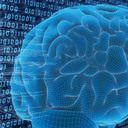Version 1.7 a new dawn
lecture: From Computation to Consciousness
How computation helps to explain mind, universe and everything

How can the physical universe give rise to a mind? I suggest to replace this confusing question by another one: what kind of information processing system is the mind, and how is the mind computed? As we will see, even our ideas of the physical universe turn out to be computational. Let us explore some fascinating scenery of the philosophy underlying Artificial Intelligence.
How do minds work? In my view, this is the most interesting question of all, and our best bet at answering it lies in building theories that we can actually test in the form of computer programs, that is, in building Artificial Intelligence. Let us explore some of the philosophical ideas that explicitly or implicitly form the basis of Artificial Intelligence.
The idea that minds are some kind of machine, mechanical contraptions, seems to be unconvincing, even offending to many people, even if they accept that the physical universe is a machine, and minds are part of that universe. Computer science has revolutionized our concept of machines, though: no longer do we see machines as mechanical arrangements of parts that pull and push against each other, but as arbitrary, stable causal arrangements that perform regular changes on their environment. We can think about mathematical machines, like cellular automatons, about financial, social or ecological machines. Machines do not have to be human-made artifacts, they are a way of conceptualizing regular processes and dynamic systems. In the case of conceptualizing the human mind, what matters is not biology, chemistry, or structural properties of the brain, but what these implement: a class of machine that is capable to process information, in very specific ways. The mind is not necessarily a mechanical machine, but certainly an information processing machine, a computational system.
Computationalism is the notion that minds can and have to be modeled as computational, and in its strong form, it maintains that the mind actually _is_ a computer, implemented by a physical mechanism. But the ideas of computation have permeated our understanding of the world even further. Our understanding of physics no longer conforms to mechanical world views (i.e. parts and particles pulling and pushing against each other), but requires us to switch to the broader notion of how the universe processes information. The foundational theories of physics are concerned with how the universe is computed.
In the view of universal computationalism, the question of what sort of thing minds are resolves into the question whether hypercomputation is possible, and if not, what classes of computation are involved in their functionality.
Computationalism systematizes the intuitions we get naturally while we program computers, and it helps us understand some of the deepest questions of cosmology, epistemology and the nature of the mind in ways that did not exist in the past.
Info
Day:
2014-12-28
Start time:
11:30
Duration:
01:00
Room:
Saal 2
Track:
Science
Language:
en
Links:
Feedback
Click here to let us know how you liked this event.
Concurrent events
- Saal G
- Why is GPG "damn near unusable"?
- Saal 6
- Uncaging Microchips
- Saal 1
- Switches Get Stitches
Speakers
| Joscha |